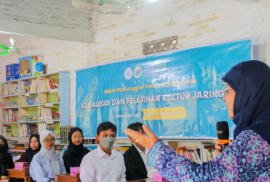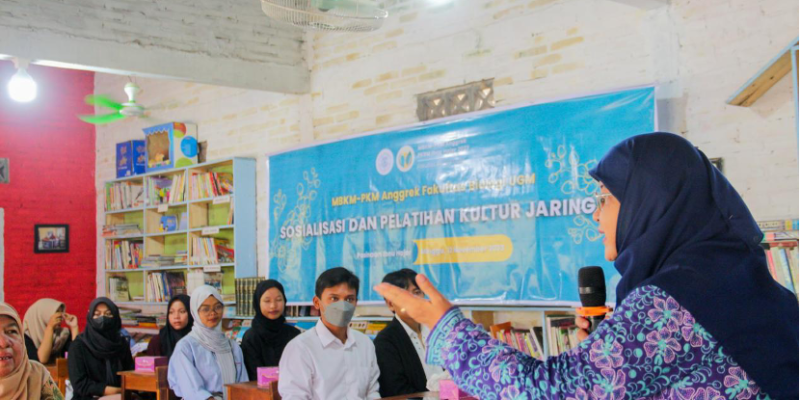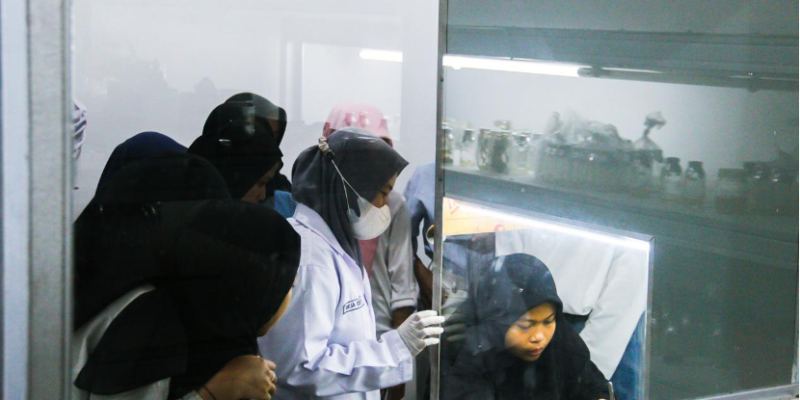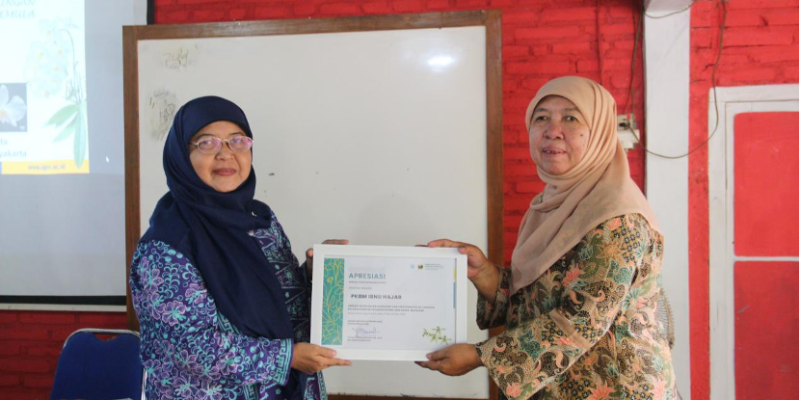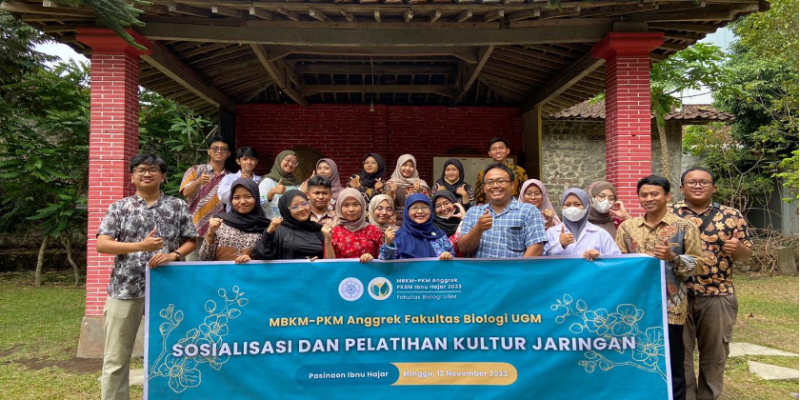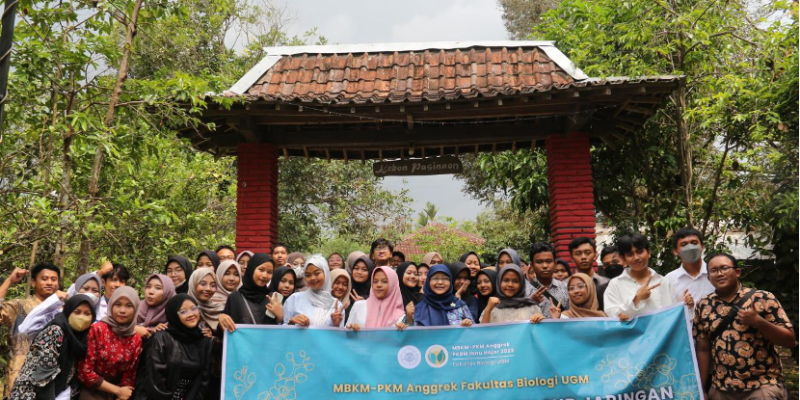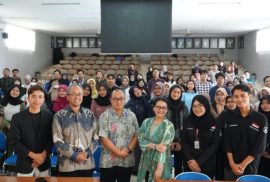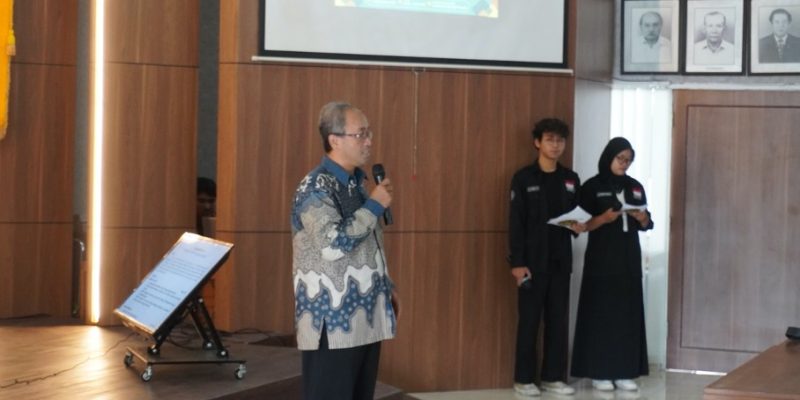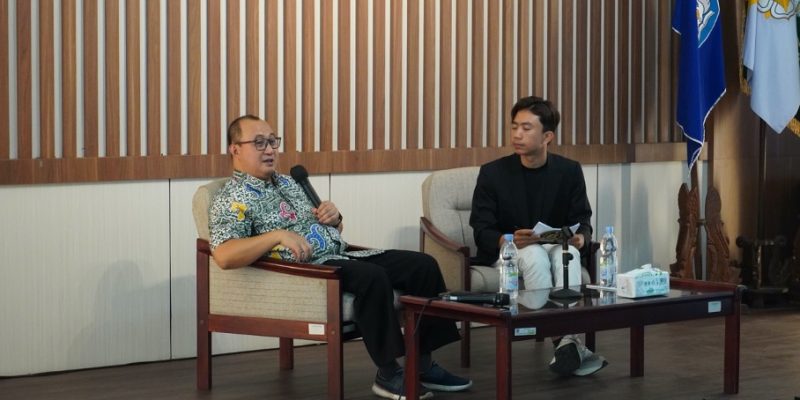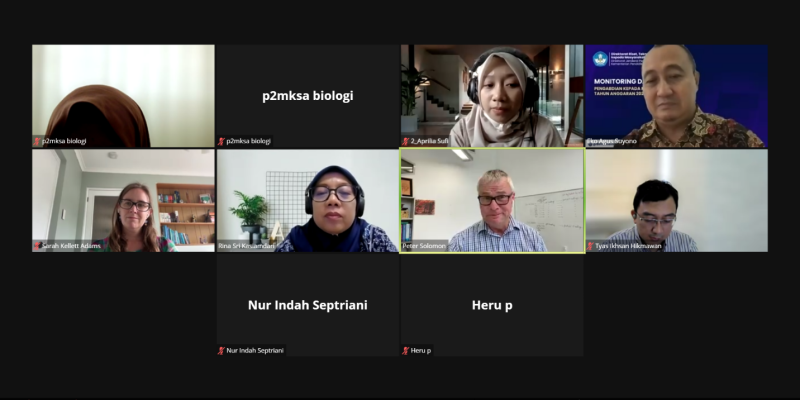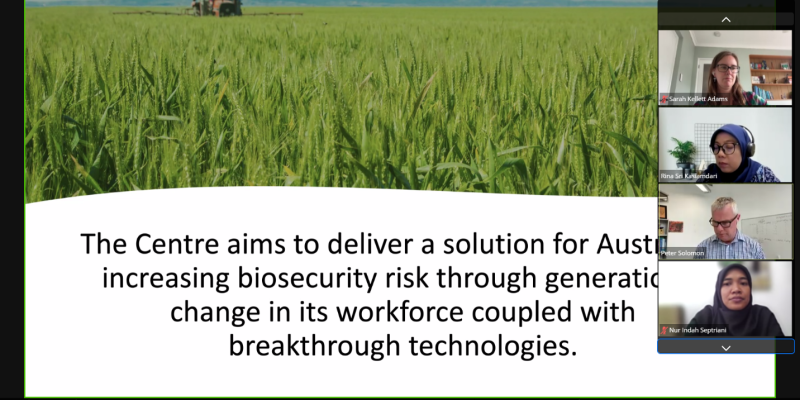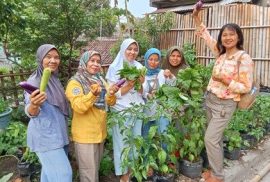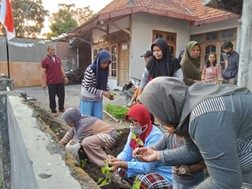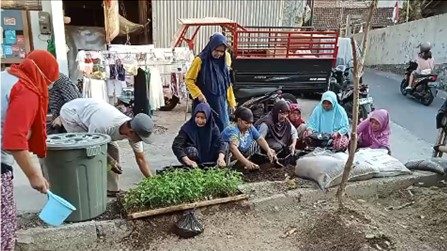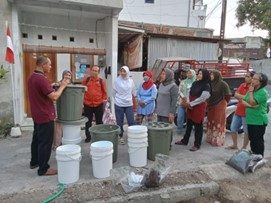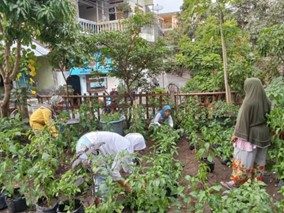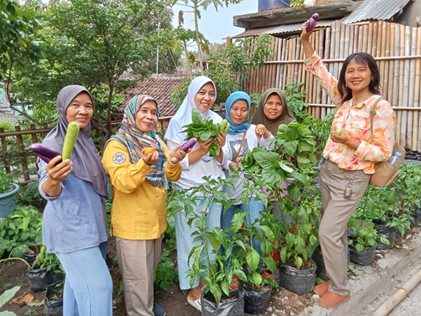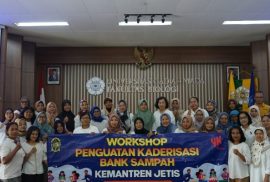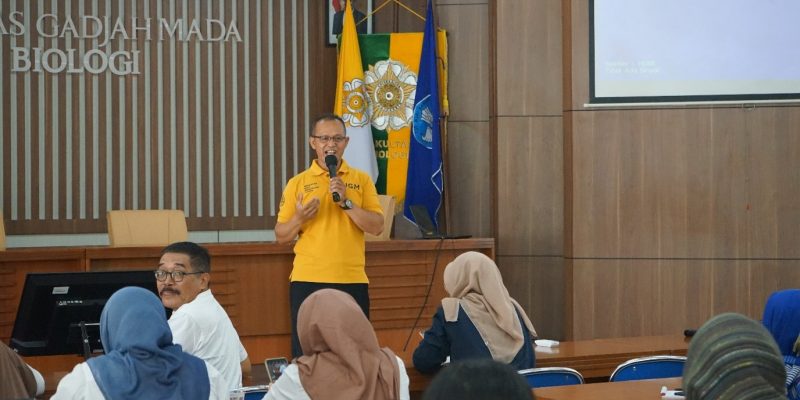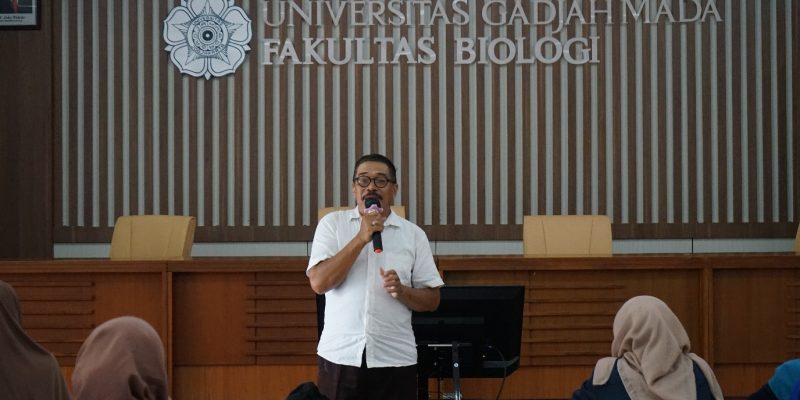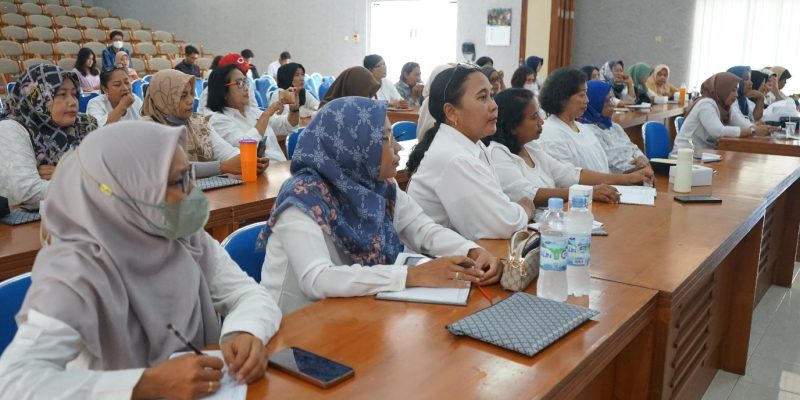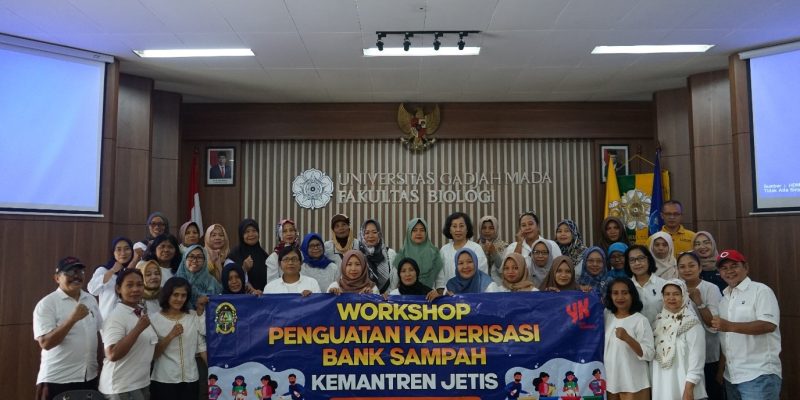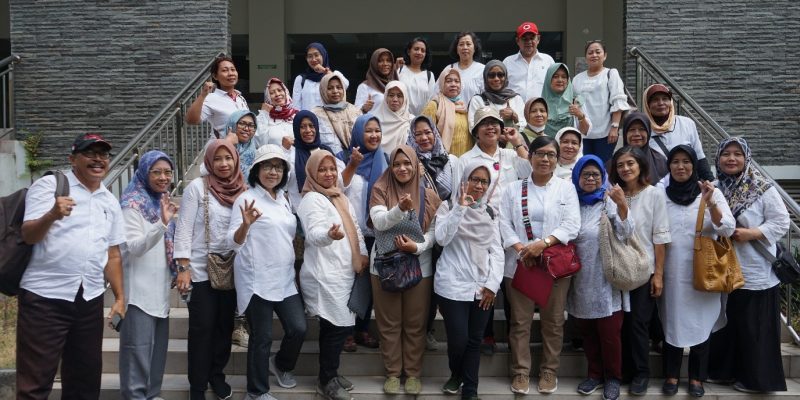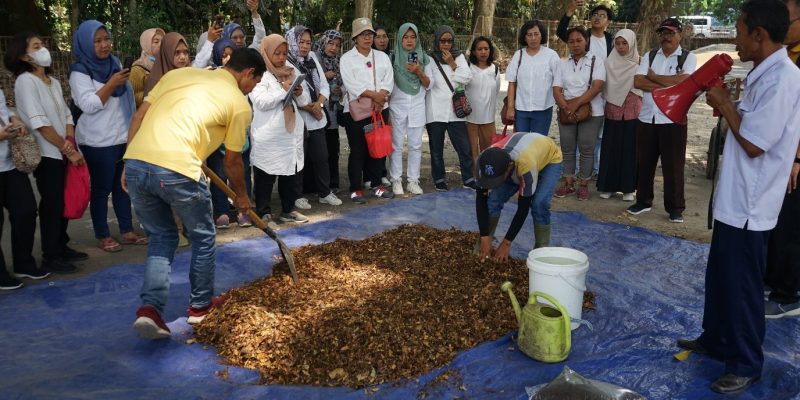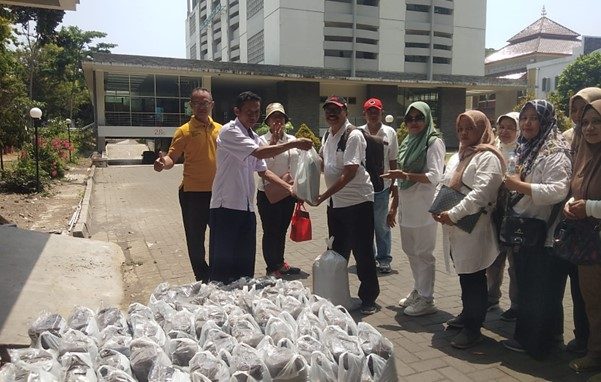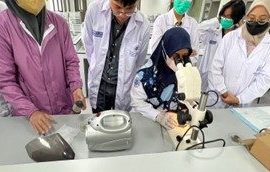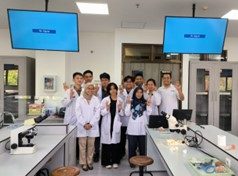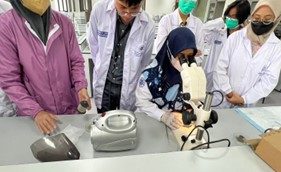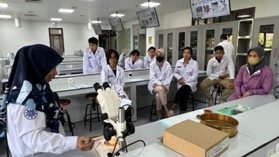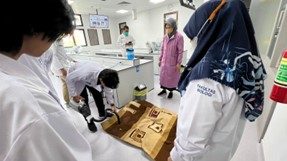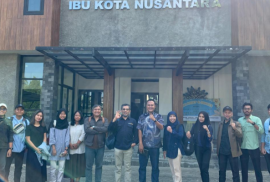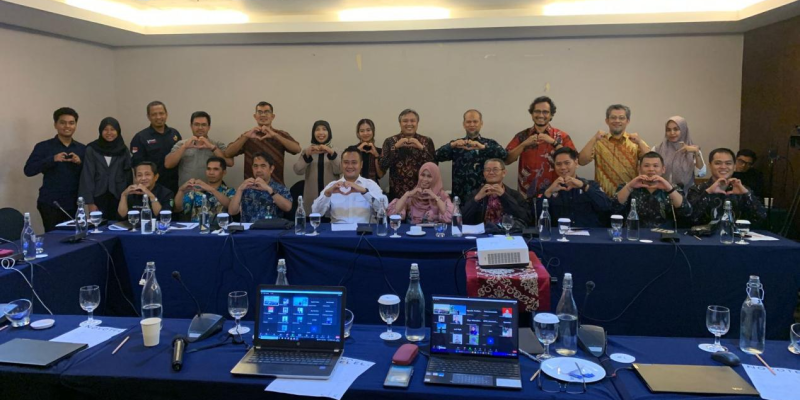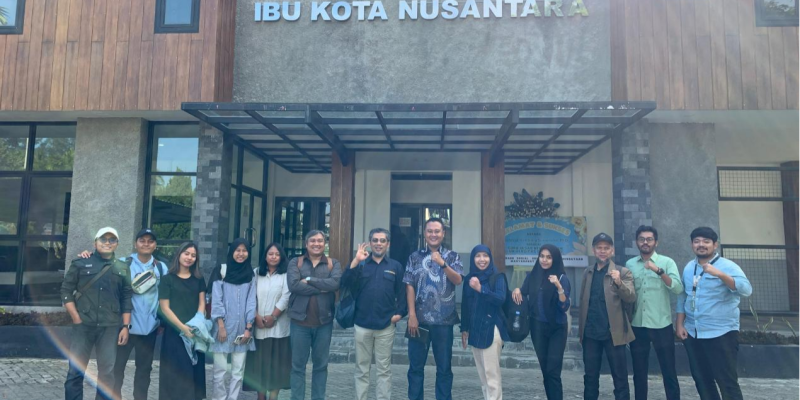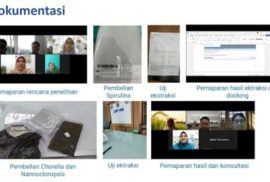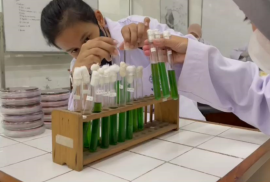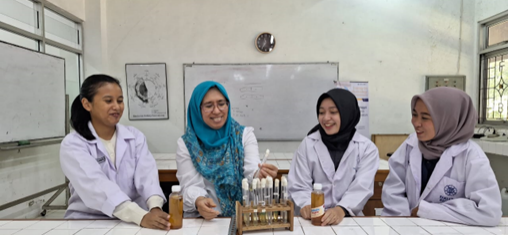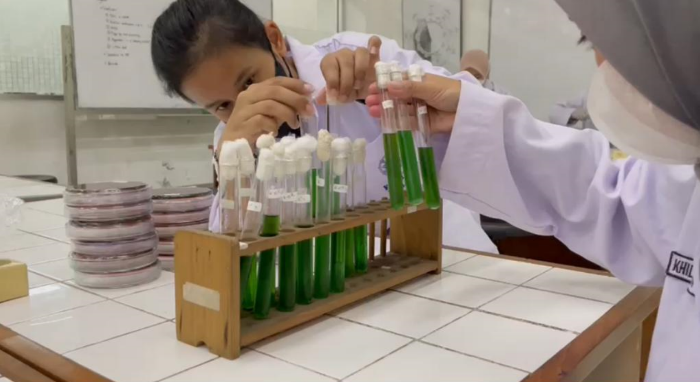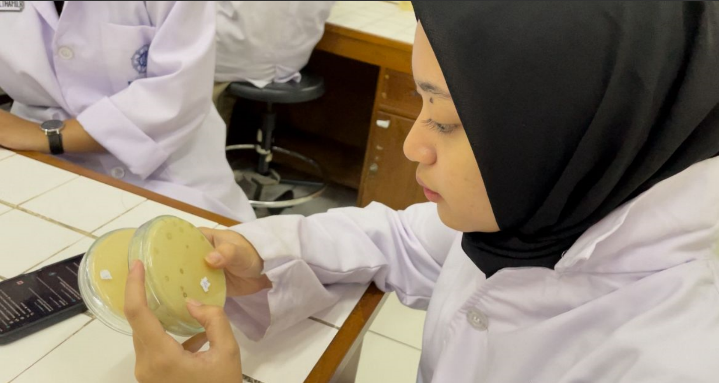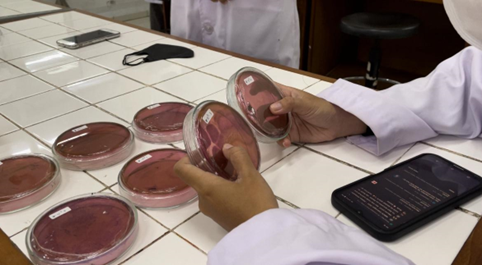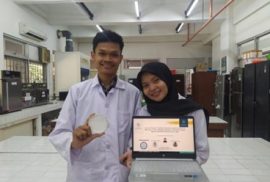Arsip:
Headline
The team of Community Service Program – Independent Learning Independent Campus (PkM-MBKM) conducted a Socialization and Tissue Culture Training on Sunday, November 12, 2023. The event took place at PKBM Ibnu Hajar (Pasinaon Laboratory) in Sirahan Village, Salam District, Magelang Regency, with 30 participants from SMK Negeri 1 Salam. The event was successfully conducted with Prof. Dr. Endang Semiarti, M.S., M.Sc., as the supervising professor, along with 19 biology students of the Faculty of Biology, UGM.
PKBM Ibnu Hajar is a non-formal learning institution initiated by the community. This institution facilitates learners to study and develop skills outside formal schooling. One of the facilities owned by PKBM Ibnu Hajar is the Pasinaon Laboratory, a household-scale laboratory that can be used for plant propagation using tissue culture techniques. This facility opens up new potential that can be utilized by various groups, both in terms of education and the economy. Therefore, the PkM-MBKM Orchid Team conducted tissue culture training for the young generation of Indonesia, especially students from SMK N 1 Salam, to maximize this potential in creating a skilled generation to realize Indonesia Emas in 2045.The topic of this activity supports the Sustainable Development Goals (SDGs) program for 4 goals, namely goals 3, 4, 11 and 17: Good health and well-being; Quality education; Sustainable cities and communities; and Partnership to achieve goals.
The activity was opened by MC Safira Ameliani Ifada, followed by remarks from Dra. Ida Fitri Lusiana, the Founder of PKBM Ibnu Hajar, and Prof. Dr. Endang Semiarti M.S., M.Sc. in this event Prof. Dr. Endang Semiarti M.S., M.Sc delivered material on “Introduction to Orchid Cultivation with Tissue Culture for Beginners” that covered the introduction of various orchid species and their importance as national biodiversity, cultivation and care processes, and economic prospects. After the presentation, the training on sowed orchid planting and subcultured Cymbidium ensifolium orchid explants was carried out and was guided by 6 students: Anisa Dewi Rahayu, Siddharta Arya Anggoro Cen, Novi Astuti Indra Paranita, Gerald Dafa Rizaldy, Khansa Huwaida, and Gina Septiani Agustin. The training concluded with an interactive discussion between the participants and the PkM-MBKM team. The activity ended with the presentation of certificates and the textbook “Plant Biotechnology” from the Faculty of Biology, UGM, to SMK N 1 Salam and the PKBM Ibnu Hajar Library.
It is expected that this activity will be the starting point for Sirahan Village and SMK N 1 Salam in developing tissue culture skills. The basics of tissue culture techniques taught in this event can be further developed and utilized by the participants. The advancement of technology has made tissue culture techniques easy and affordable, allowing them to be performed even with simple tools and materials. Furthermore, the rapid and uniform production of plants by tissue culture will enhance plant production, contributing to economic advancement. Collaboration between PKBM Ibnu Hajar and Pasinaon Laboratory with the Faculty of Biology UGM can continue to be sustainable to achieve the goal of improving the education of the younger generation which will support the community’s economy [Authors: Muhammad Fityatul Haq and Fitra Laras Wigati]
On Saturday, November 4, 2023, the Public Opinion Management Department of the Faculty of Biology, Universitas Gadjah Mada (UGM), and the Student Press Institution of the Faculty of Social and Political Sciences (FISIPOL) at UGM successfully held a seminar with the theme “Utilization of Biomass for New Renewable Energy” entitled “Potentials and Challenges of Biomass as New Renewable Energy” held offline at the Tropical Biology Auditorium, Faculty of Biology. The event addressed issues related to new renewable energy, focusing on both scientific and social perspectives.
The seminar was led by Muhammad Farrel Zharif Zidane and Fatiha Esti Murwani as the MCs and was attended by approximately 150 participants from various faculties within UGM and participants from outside UGM. The seminar commenced with an opening by the MCs, followed by the singing of the Indonesian national anthem, the Gadjah Mada University Hymn, and the Faculty of Biology March. The event continued with addresses from Rima Arvisya Natania Putri, the head of the organizing committee, and Fathur Syahrian Ramadhani, the head of the Biology Student Executive Board (BEM). Subsequently, the main activities included presentations moderated by Muhammad Fauzi. The first speaker, Dr. Eko Agus Suyono, S.Si., M.App.Sc., discussed renewable energy and its utilization from a scientific perspective. He is an expert in Plant Biology and algae and their utilization in developing renewable energy. The second speaker, Prof. Dr. Poppy Sulistyaning Winanti, S.IP., M.PP., addressed the social perspective related to the use of renewable energy in society. Poppy has extensive experience in research and analysis related to social issues.
This seminar provided a platform for participants to discuss current issues related to energy and to inspire positive actions in the development of renewable energy in Indonesia. The event was a result of collaboration between the UGM Biology Student Executive Board and SINTESA FISIPOL UGM in an effort to enhance understanding and awareness of the importance of renewable energy in both scientific and social contexts.
Yogyakarta, 9 November 2023 – As part of its commitment to expanding its network in the international arena, Faculty of Biology UGM has initiated another collaboration with the Australian National University (ANU). The online meeting was held attended by Prof. Peter Solomon as Director of The ARC Training Center in Plant Biosecurity and Sarah Adams as Business Development Manager at the Australian National University. From the Faculty of Biology UGM was attended by Dr. Eko Agus Suyono as Vice Dean for Research, Community Service, Collaboration and Alumni Affairs, Nur Indah Septriani, Ph.D. as Head of the International Affairs Office, Faculty of Biology, Rina Sri Kasiamdari, Ph.D. from the Plant Systematics Laboratory, and Dr. Aprilia Sufi Subiastuti from the Microbiology Laboratory, Faculty of Biology, UGM.
The Australian Research Center (ARC) Training Center in Plant Biosecurity is a study center at the Australian National University which collaborates with various parties including institutions, research institutes, universities, and stakeholders both in Australia and in other countries. Through his presentation, Prof. Peter explained the urgency of plant biosecurity in its role to prevent and overcome pests and diseases in plants which indirectly impact the economy and the environment. The training center also focuses on developing new technologies in plant biosecurity research. Prof. Peter also said that the training center does not only focus on research development but also on developing capabilities and facilities for researchers. He revealed that at least 17 doctoral students and 4 post-doctoral students from various countries and institutions expected to be involved in the training center and research center.
Dr. Eko expressed his appreciation for the collaboration initiative with ANU, especially with the ARC Training Center in Plant Biosecurity. He said that this collaboration could be developed towards more specific collaborations, including workshops and certification for lecturers and researchers, as well as research and publication collaboration between researchers at the Faculty of Biology and ANU as well as other researchers who could collaborate through the development of training and research centers at the best universities in Australia. the. This is also related to the development of a study center at the Faculty of Biology UGM, the Study Center for Biodiversity, Bioprospecting, and Biosecurity. Dr. Eko also revealed plans to extend cooperation with ANU and opportunities to explore collaboration with various research and publication funding schemes in the future.
This meeting is a step for the Faculty of Biology to improve the quality of education by collaborating with partners at the international level as well as building good relationships, especially with the Australian National University, which has been established since 2017. In addition, this collaboration is a commitment from the UGM Faculty of Biology in supporting sustainable development and in accordance with sustainable development targets (SDGs), namely good quality education (SDGs 4) and revitalization of global partnerships (SDGs 17).
The event took place at the meeting hall of RW 06, Dukuh Mrican, Kalurahan Catur Tunggal, Kapanewon Depok, introducing various ‘Living Pharmacy’ and nutritious vegetables that are highly beneficial and can support family food resilience. Following the meeting featuring speakers Dr. Djoko Santosa, M.Sc, and Dr. Dra. Rr. Upiek Ngesti Wibawaning Astuti, DAP&E, M.Biomed, the activity proceeded with land preparation in four Neighborhood Associations (RW), namely RW 04, 06, 07, and 08.
This initiative, ongoing from October to November, prepared land in these four RWs for planting TOGA and vegetable seedlings, nurturing them, conducting planting, maintenance, harvesting, and post-harvest monitoring. One of the prepared lands covers an area of 540 square meters, managed by the village fund, capable of accommodating TOGA seedlings and various vegetable plants. Additionally, utilizing lands along the riverbanks has provided positive engagement for PKK members, particularly those involved in the Srikandi Women Farmers Group. Geographically, the Mrican hamlet (specifically RW 04, 06, 07, and 08) is considered a suburban area since its environment exhibits urban characteristics. To the west, there are two large universities, while to the east, there are densely populated settlements, characterized by steep conditions, separated by Gejayan Street.
The dissemination and practical guidance on land cultivation procedures, planting, and fertilization were conducted in September by Dwi Ummi Siswanti, S.Si., M.Sc, and Soenarwan Hery Poerwanto, S.Si., M.Kes.. The vegetables planted include chili, tomatoes, white eggplants, purple eggplants, red spinach, green spinach, cabbage, purple cabbage, lettuce, celery, etc. Additionally, a hydroponic system was established for lettuce. As for the prepared TOGA, they include red betel leaves, green betel leaves, turmeric, temulawak, lesser galangal, red ginger, lemongrass, sand ginger, and several other plants.
Organic waste processing is a method of managing waste derived from organic materials, such as food scraps, leaves, and other organic matter that can naturally decompose. The goal of organic waste processing is to reduce negative environmental impacts and utilize the potential energy or products that can be generated from organic waste. Managing waste is a positive activity to mitigate various negative impacts caused by waste, both on the environment and human health. Therefore, it is important to implement sustainable waste management practices, such as recycling, reducing plastic usage, and educating the community about the importance of environmental cleanliness. Additionally, governments, communities, and the private sector need to collaborate to create sustainable and environmentally friendly solutions. This aligns with the Sustainable Development Goals (SDGs), specifically Goal 12, which emphasizes sustainable waste management as a form of responsibility for consumption and production.
The Faculty of Biology at UGM once again received a visit from Kemantren Jetis, Yogyakarta, to learn about organic waste management using Bio Ferti 2023. “This activity aims to support the growth of family awareness in improving the quality of environmental sustainability, especially in Kemantren Jetis and in the Special Region of Yogyakarta in general,” said Mr. Joko Sularno, Chairman of the Kemantren Jetis Waste Bank Forum, in his remarks.
The event was summarized in the Strengthening Workshop for the Cadres of the Kemantren Jetis Waste Bank on Friday, November 10, 2023, at the Tropical Biology Auditorium and the Organic Waste Processing Area of the Faculty of Biology at UGM and was attended by 40 people, including cadres from the Kemantren Jetis Waste Bank and Waste Bank Groups at the RW level in Kemantren Jetis. The workshop was divided into two sessions: the first session included presentations and an introduction to organic waste processing at the Faculty of Biology at UGM, while the second session involved observing the practical process of organic waste processing by the UGM Faculty of Biology Waste Management Task Force.
Mrs. Zaenab, Acting Head of the Kemakmuran Office of Kemantren Jetis, expressed gratitude to Mr. Soenarwan Hery Poerwanto, S.Si., M.Kes., Chairman of the Waste Management Task Force at the Faculty of Biology at UGM, and to the leaders of the Faculty of Biology at UGM for granting permission and welcoming the group to learn about organic waste management using Bio Ferti 2023. She hoped that the participants would bring back useful knowledge after the visit.
On Friday, 10 November 2023 was held collection, identification, and culture of House Dust Mites (HDM), especially from the Dermatophagoides genus in the Laboratory of the Department of Parasitology at FKKMK UGM. The activity was attended by students from the Medical Program, including IUP class (5 students), Regular class (3 students), and 1 student from the Master’s Program in Medicine. The event was conducted with Dr. Dra. Rr. Upiek Ngesti Wibawaning Astuti, B.Sc., DAP&E, M.Biomed as the instructor, along with Rizkiani Amalia, S.Si., M.Sc, and assisted by Mrs. Kuswati. This activity was aimed to introduce the collection of HDM, perform identification, purification, and continue with cultivation.
House Dust Mites are microscopic and can be found in almost every dusty area in homes, especially in regions with a tropical climate like Indonesia. They belong to the Phylum Arthropoda, Class Arachnida, Order Acarina. These mites are known to trigger allergies on the skin and respiratory tract. Ths activity focused on differentiating between Dermatophagoides pteronyssinus and Dermatophagoides ferinae, both in males and females.
This activity, especially the cultivation and differentiation of species, is expected to support research related to HDM. This includes testing food preferences, environmental suitability, density, reproduction, allergen proteins, and much more. Furthermore, this activity provides students with skills and motivation to develop research-based knowledge with HDM.
The Nusantara Capital (IKN) designated to be located in the Penajam Paser Utara and Kutai Kertanegara regencies, is designed to be built with the concept of a forest city. In this concept, the majority of the IKN area consists of green open spaces, including both city forests and city parks in the Core Government Center area and its surrounding areas. The implementation of the forest city concept, which is planned to be 75% green open spaces, even requires the establishment of district parks and village parks. In order to realize this concept, Universitas Gadjah Mada has been entrusted by the Nusantara Capital Authority to develop a forest management plan for the IKN region. The UGM team assigned to this task comes from various faculties and fields of study, including the Faculty of Forestry, Engineering, Law, and Biology.
The Faculty of Biology was represented by Prof. Dr. Ratna Susandarini, M.Sc., from the Plant Systematics Laboratory. The role of the Plant Systematics lecturer in the team is to determine the plant composition suitable for each type of green open space in IKN. The selection of tree, shrub, bush, and herb species that make up the vegetation in various types of green open spaces considers several aspects, including maintaining biodiversity by including endemic plant species from Kalimantan and plants with ecological and aesthetic functions. The UGM team carrying out these tasks held a Focus Group Discussion (FGD) in Balikpapan on November 9, 2023, followed by field surveys on November 10, 2023.
The FGD on the IKN Biodiversity Master Plan, held in a hybrid format, was attended by representatives from government agencies managing forests, academics, and non-governmental organizations that have interacted with the community in the IKN region. The input from these stakeholders gathered through the FGD will be taken into consideration in the preparation of documents for forest management planning and guidelines for green open space landscapes in IKN. During the field survey, several areas visited included mangrove areas, land designated for the forest city, and the Bukit Bangkirai Natural Tourism Park as a reference ecosystem.
[MBKM] Microalgae is known for its benefits, typically used as an additional feed ingredient in aquaculture, microalgae plays a role in weight gain and enhancing disease resistance in fish. This particular topic was pursued by the MBKM Research Team from the Faculty of Biology, Universitas Gadjah Mada, consisting of Dimas Anggoro Putranto, Hardian Ridho Alfalah, and Rahmi Ramadhani Putri.
The research project was titled ‘In Silico Study of the Potential of Microalgae as an Immunostimulant Feed Source for Eel.’ This research aimed to explore the potential of microalgae: Chlorella sp, Nannochloropsis sp, and Spirulina sp. The MBKM research activities collaborated with INBIO to develop innovations and enhance students’ skills in the fields of bioinformatics and biomolecular studies. INBIO (Indonesia Bioinformatics and Biomolecular) is an institution specializing in bioinformatics and biomolecular analysis services in Indonesia. Apart from conducting research, the students also had the opportunity to intern at Inbio for one year. During the MBKM activities, the students identified microalgae and performed extractions using maceration methods for phytochemical content analysis using GC-MS. Additionally, they conducted research on target proteins in the PDB and ligand in PubChem. The students also prepared proteins and ligands, followed by docking processes, interaction visualization, and data analysis.
According to Nur Indah Septriani, S.Si., M.Sc., Ph.D., the supervising lecturer, this initiative marks the initial steps in further research on the potential of microalgae as an immunostimulant feed source for eel. This research endeavor aims to create innovations beneficial to society. ‘Through this MBKM research program, we hope students can broaden their perspectives not only within the campus but also beyond (related institutions), fostering an inclusive educational environment accessible to anyone, anywhere. This aligns with SDG number 4, which aims to enhance the quality of education,’ expressed Ms. Indah.”
Kombucha is one of the fermented beverages containing acetic acid bacteria with probiotic properties, beneficial as both a traditional and herbal drink. The presence of acetic acid bacteria with probiotic properties in kombucha makes it functional for the human body, including maintaining digestive health, enhancing the immune system, and supporting overall immunity. During storage, the quality of kombucha products may deteriorate due to improper conditions and duration of storage.
The Independent Learning Independent Campus (MBKM) Research Team from the Faculty of Biology, UGM, led by Prof. Dr. Endah Retnaningrum, M. Eng, along with Audy Syavanova, Khilin Shafa Nisa, and Virsandhita Althafio Ribowo, conducted research activities on testing the fermentation product of lemon tea kombucha “Kopi Oemah Martani” from August 28 to October 23, 2023. The quality of kombucha products stored at room temperature and in the refrigerator, each for 0, 7, and 14 days, was compared based on the observation of several test parameters. The analyzed test parameters included pH value, sugar content, acetic acid content, the amount of acetic acid bacteria, yeast, and coliform bacteria.The test results indicated that lemon tea kombucha products stored in the refrigerator for 7 days exhibited the best quality, with a taste and aroma preferred by the respondents.
[MBKM] The MBKM Team from the Faculty of Biology at UGM, consisting of Zildan Basara (Biology 2020) and Mia Fadilah (Biology 2020), under the guidance of Didik Huswo Utomo, Ph.D., as INBIO Supervisor, and Sari Darmasiwi, S.Si., M. Biotech., Ph.D., as MBKM Supervisor, examined the antibacterial activity of active compounds from the Russula aeurginea mushroom against opportunistic skin pathogens Staphylococcus spp. through in silico and in vitro studies. The research investigated two distinct titles: ‘In Silico Study of Antibacterial Activity of Russula aeruginea Compounds against Staphylococcus hominis using Molecular Docking via Alphafold Approach’ and ‘Analysis of Russula aeruginea Fungus Potential as Antibacterial against Opportunistic Skin Pathogens Staphylococcus aureus, Staphylococcus hominis, and Staphylococcus epidermis through Reverse Docking Method.
Staphylococcus spp. bacteria are gram-positive bacteria that typically exist as normal flora on human and animal skin. However, certain strains of Staphylococcus spp. can cause infections in humans, including skin infections, urinary tract infections, pneumonia, and central nervous system infections. One way to combat Staphylococcus spp. infections is through antibiotic use. However, excessive antibiotic use leads to antibiotic resistance in these bacteria.An approach to address antibiotic resistance involves discovering new bioactive compounds with antibacterial activity against pathogenic bacteria, including harnessing fungi. Fungi are widely used in various fields such as food, medicine, and cosmetics. One intriguing fungal genus for research is Russula. Among numerous Russula species, Russula aeruginea remains understudied. R. aeruginea is a food fungus found in Indonesian forests.
The research revealed antibacterial compounds from Russula aeruginea through wet lab and dry lab methods. The wet lab employed GC-MS, yielding the dominant compound 8,11-Octadecadienoic acid methyl ester. Meanwhile, dry lab results identified 21 active compounds, including russulanorol, 2,4,6-octatriyn-1-ol, ergosterol, lactarolide A, and SHCHC, showing antibacterial activity against Staphylococcus spp. Therefore, the molecular docking research concerning bioactive compounds from Russula aeruginea against Staphylococcus spp. plays a crucial role in developing new therapeutic potentials and discovering antimicrobial compounds for combating antibiotic-resistant bacterial infections.”

